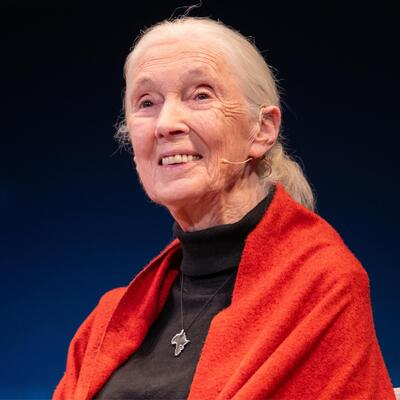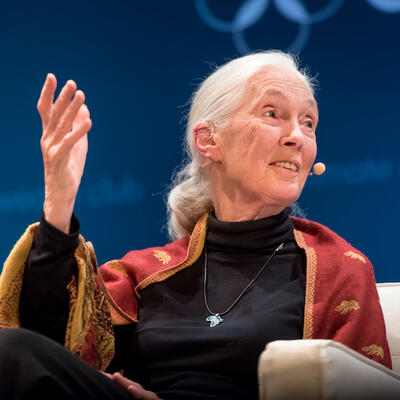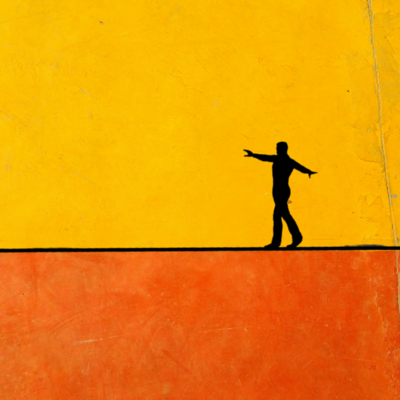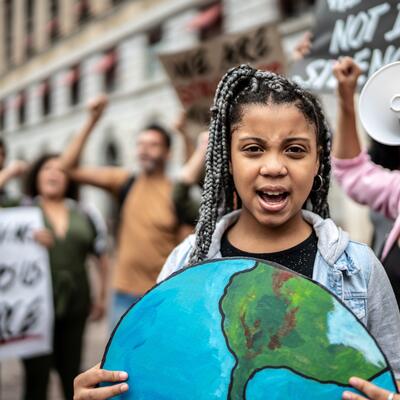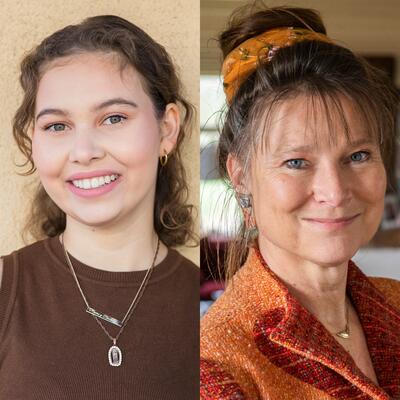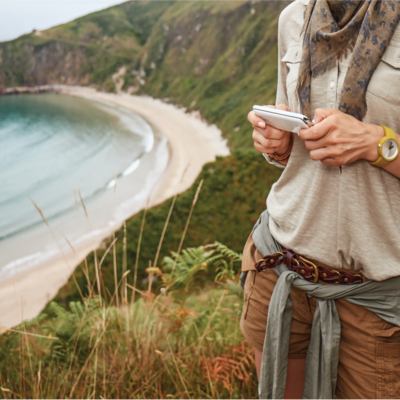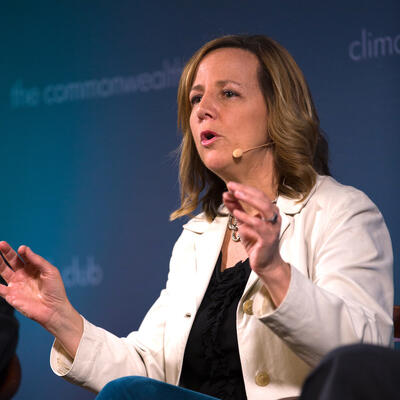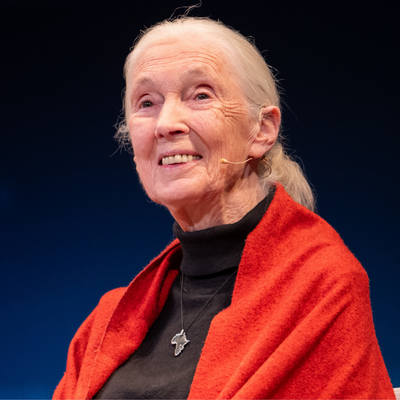
Remembering Dr. Jane Goodall
Guests
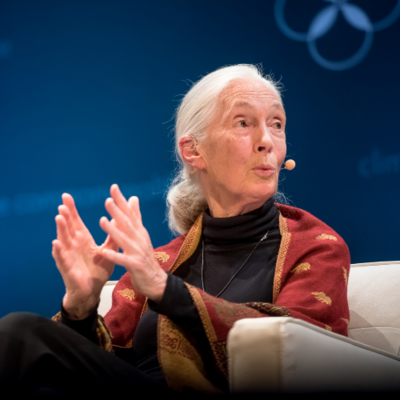
Jane Goodall
Summary
Legendary primatologist Jane Goodall died on October 1. In her memory, we’re revisiting a 2024 conversation with the indefatigable Goodall.
Goodall said the reason we are facing ecological crises in the first place is because, “We've lost the connection between the clever brain and the human heart, which is love and compassion.” The question, she says, is “Do we want to be the one species who comes onto the planet and destroys it?”
Even at 90 years old, Jane Goodall was still touring the world, firing up audiences and inspiring people to care about the natural world. For this conversation, she has a special message: "Vote for nature. Every single vote matters.”
It can be difficult to take action on climate change when the problem feels so big. To make it more manageable, Goodall wanted people to think locally: “What do you care about there? Can you try and do something about that? Maybe you care about litter. Maybe you care about people in the street, homelessness, whatever you care about. See if you can find something to do about that problem.”
One way Goodall helped to get young people active in their communities was through a program she established called Roots and Shoots. The program, for youth from kindergarten through college, is highly localized. "As a group you choose three projects, one to help people, one to help animals, one to help the environment, and then you discuss what can we do to improve this in our community.”
Goodall said the program got its name from trees: “Think of your favorite tree. It probably began with a little seed. And when it started to grow, there'd be little roots and a little shoot. And if you picked it up, it would seem so weak and powerless. And yet there's a life force, a magic in that seed, so that those little roots to reach the water can work through rocks and eventually push them aside. And that little shoot to reach the sun can work through a brick wall and eventually knock it down.”
Resources From This Episode (2)
Full Transcript
Note: Transcripts are generated using a combination of automated software and human transcribers and may contain errors. Please check the actual audio before quoting it.
Greg Dalton: This is Climate One. I’m Greg Dalton. On October 1st, the world lost a true icon. Jane Goodall was a tireless advocate for conservation, education, and community engagement. She inspired thousands of young people to follow in her footsteps.
As a young woman, Jane Goodall immersed herself in the study of primates, and emerged with discoveries that challenged and changed what we know about our closest animal relatives. Later in life she became a powerful voice for climate action to protect ourselves and the nonhuman world.
She traveled constantly and died peacefully in her sleep in Los Angeles. Naturally, she was on a speaking tour. She didn’t like to travel that much, but she thought it was necessary to spread her gospel.
I had the great pleasure of speaking with Jane Goodall on Climate One twice, both times in front of a live audience in San Francisco. In 2017 we celebrated her 83rd birthday complete with a chimpanzee cake. It amazed me how young people were enthralled by her and how her quiet yet irreverent personality moved audiences.
In honor of her passing we’re re-visiting my conversation with her last year at the Sydney Goldstein Theater in San Francisco.
Jane Goodall: I always feel connected. You know, when I come up to give a talk, I sort of open my heart up so that the talks I give are basically the same. They're different depending on who I'm talking to, and that can only happen if you kind of open yourself to the feeling in the room.
Greg Dalton: Hmm. Okay. And you do this all the time. You, you were in Miami recently in Atlanta speaking to thousands of people. How do you keep recharged doing that all the time.
Jane Goodall: Because I care about the future because I care passionately about the environment and wild animals biodiversity because I've got grandchildren and probably at least two of them will soon have their own children because I care about children. But most of all, it's the future of this planet. And do we want to be the one species who comes onto the planet and destroys it?
Greg Dalton: Right, and, and in almost a couple of generations, were the only. Species that kind of destroys our own home with, uh, this intellectual brain that we think is so clever. If we're so clever, why are we destroying our own home?
Jane Goodall: Because we've lost the connection between the clever brain and the human heart, which is love and compassion. The, the divide between the haves and the have-nots is getting wider and wider, and the few people who have unsustainable lifestyles are doing a tremendous amount to destroy the, the environment.
But then on the other hand, so is poverty. Poverty isn't talked about enough, but the really poor people. In, in the rural areas, they destroy the planet simply to survive cutting down the trees to make money from charcoal or timber in Africa, or to make more land to grow food for their growing families.
And in the urban areas, they buy the cheapest junk food 'cause it's all they can afford. They can't afford as we three can to ask where did it come from? How was it made? Did it harm the environment? Was it cruel to animals like factory farms? Is it cheap because of unfair wages they have to buy the cheapest to.
Greg Dalton: You write and talk a lot about hope. You have a hope cast that I've listened to. It's very good, and I have a complicated relationship with the word hope and you. Wrote a book about it. Um, you wrote that hope is misunderstood. It is often seen as passive. So what is hope? Is it a feeling? Is it a skill? And how do you access it?
Jane Goodall: Well to me, if we lose hope, we are doomed because of people. If everybody loses hope, particularly young people, what's the point of doing anything if you don't hope that what you do will make a difference.
Greg Dalton: Drink and be merry. Tomorrow we die.
Jane Goodall: Yeah, tomorrow we die. And then the wealthy who don't really care because they only care about the moment, will carry on and as as they are doing.
But you know, people come to me and they say, well, I'm really depressed. What can I do? I'm just one person. The world's in a mess. And I say, stop thinking that you can change the world. Think about where you are in your own community. What do you care about there? Can you try and do something about that?
Maybe you care about litter. Maybe you care about people in the street, homelessness. Whatever you care about. See if you can find something to do about that problem. And then. You'll find you can succeed and that'll make you feel good and you want to do more. And then you can understand around the world there's other people just like you, doing what you are doing.
And then you get a feeling of, yes, we can.
Greg Dalton: Bill McKibbon recently wrote about a very positive story about a quiet, silent solar revolution in Africa where distributed solar is being deployed. It's not showing up in government statistics and it's, it's reaching people who need it the most.
'cause they have unreliable energy. They can't afford it, and it's really happening. What are some positive stories that you've seen recently?
Jane Goodall: Well, it's amazing. I mean, I, I do travel all over the world just about. Everywhere and just about every culture there are people, more and more people passionate about the environment. I think that's one very positive bit of news that more and more people understand more and more people want to do something about the climate.
Well, I've, I've got this youth program and the youth are in, in this program. Passionate about making the world better and they care and they act. It's all about taking action. There's about 1,500 groups in across mainland China, for example. So this, this understanding of what we're doing to the planet is growing. That in itself is good news. In 1960, Gombe National Park, where I studied the chimps, was a part of the great equatorial forest belt, and by the end of the 1980s, it was a tiny island of forest. All around were bare hills. The people were cutting down the forest to survive. And that's when it hit me that. We need help these people find a way of making a living without destroying the environment. And we started this program Tocari, and it's very holistic, but includes not just restoring fertility to overused farmland without chemicals, um, and growing more food. On that newly restored land, but scholarships to give girls a chance of secondary education because they're the mothers affecting their children.
Um, microcredit, which I feel is tremendously important so that poor villagers can take out a tiny loan to start their own small, environmentally sustainable business. And then when they pay back and it's over 90% that do pay back in our program, they're proud. It's mine. I did it. So thanks to Dr. Mohammed Eunice for that.
Greg Dalton: Mm. Recently passed. Yeah, yeah. Right. But they, um, yeah, I remember. You know, when he spoke at the Commonwealth Club, he said, you know, why do banks make loans to people who have money? They're not the ones who need money. You need to make loans to people who don't have money.
Jane Goodall: And by the way, that program is in six other African countries now, so it's raising people outta poverty and no more bare hills. The trees have come back.
Greg Dalton: A couple of years ago you wrote, co-wrote the book with Douglas Adams, the Book of Hope, and you wrote about your four reasons for hope, one of which is the, the power of young people as well as the, the human spirit and the resilience of nature, which we've talked about an amazing human intellect, but let's talk about young people, a lot of young people.
Are scared and they're angry and there's a real mental health crisis among US youth. I don't know if that's international. So what do you say to young people who are, who are scared and worried about what naturally they're, they're gonna live in longer than you and I will.
Jane Goodall: It is very simple. I tell them to join Roots and Shoots our youth program because I've seen, I mean, I don't think it's a single child and we are kindergarten through university who doesn't join Roots and Shoots take an active role in it. Uh, and. Feel hopeful about the future. Hundreds of them have told me, I feel completely different now.
I feel there is hope for the future. The reason it's called Roots and Shoots is because if you think of a big tree, you love trees. I know you probably love trees. Many people out there, well think of your favorite tree. It probably began with a little seed. When it started to grow, there'd be little roots and a little chute, and if you picked it up, it would seem so weak and powerless.
And yet there's a life force, a magic in that seed so that those little roots to reach the water can work through rocks and eventually push them aside. And that little chute to reach the sun can work through a brick wall and eventually knock it down. So we see the young people. As the roots and their shoots and all the problems are the rocks and the walls, and they will break through.
The program means that you choose yourself. We don't tell you what to do, but as a group, you choose three projects. One to help people, one to help animals, one to help the environment, and then you discuss what can we do to improve this in our community and roll up our sleeves and take action.
Or you might want to help, um, immigrants. You will feel great when you know that around the world there are other people, other young people doing the same sort of thing. So if you are, if, if young people are depressed, um, you know, tell them, of course you are depressed. We know that things are not good, but I've lived 90 years and I've seen bad times and I've seen us get over them.
And somehow this indomitable spirit within us will get us through this, along with this intellect, which we have not used wisely, but we are beginning to make a difference. And so important, and you will agree with me, is moving to a plant-based diet. And what I want to say to you, it's not just that the huge areas of land that are cleared to grow food for them, it's not just that particularly cows, you know, the food goes in here and comes out the other end, and that's methane gas and it's another vicious greenhouse gas that's, you know, affecting climate change.
But just think each one of these animals is an individual. We talk about cows cow. This is an individual cow, and this is an individual pig, and I just met a pig called a pig caso, not Picasso, pig Caso pig. Caso loves to paint. Her paintings are selling for over $5,000. Her biggest painting sold for $25,000, and she lives in Cape Town and she watched her.
A person who rescued her from a factory farm who's an artist who set up an easel and gave Picasso a brush in her mouth and she started to paint. She loves it. As soon as she sees the bucket with paints, um, she comes running out. And she even dips the brush in different colors to make her marks. And the only thing she's really been taught is at the end, she'll dip her snout in red paint and make her snout mark.
Greg Dalton: But the number of vegetarians is not growing in this country. It's just not, it's around 3% as for all the, you know, clary and alternative proteins. So how do we change such a big food system?
Jane Goodall: Compassion and empathy for animals is changing people. There's no question. And, um, the other thing which is positive, I mean, I've become a vegan because I, I've understood the horrors that go on in, in dairy farming, and, uh.
Greg Dalton: Separating young newborns
Jane Goodall: Horrible. And the, and the conditions that, that the mothers are kept in is absolutely horrible. And the same with laying chickens. It's absolutely, they're in a tiny space like this, and their egg drops through a wire bottom. And I mean, I know chickens, and we have chickens in Africa. They have personalities. They're all different. Very different. We have a cockerel called Tyson because he attacks you every time you appear.
But anyway. Um, so that, that's one side of it, but I think. Probably right now, I dunno if you agree with me, Rick, but more powerful is the devastating effect on the environment and the CO2 emissions, which come from the all the whole of agricultural farming actually. And then when you realize the difference.
When you get to permaculture and you get to Agroforestry and everybody says you can't feed more people like that, but it actually, you can grow more food that way, and we don't need genetically modified food.
And the other positive thing, you know, when I first became vegan, the food was revolting. I mean, it was just, you got a, a wilted lettuce leaf or a bit of hard half cooked asparagus or something. But now you can't tell the difference.
Greg Dalton: You mentioned you have a great-grandchild on the way, if you were young today, would, how, how would you approach thinking of having children? Because some, some young couples are saying they're not, they're choosing not to. Fertility rates are dropped.
Jane Goodall: Well, that would have to be an individual choice, but the answer is. You know if, if you are thinking about having a child get involved in programs to protect the environment for your child's future,
Greg Dalton: You're gonna do it. Make a world. You believe that, you know, change happens from inside. That, that there's a, in the climate conversation, there's lots of naming and shaming, right? Judging people. Oh, you ate a hamburger. Oh, you flew on an airplane. Just, um, not so sure. I've done that and learned the hard way of people in my life that that doesn't work, uh, people resent that. Uh, and so how do you, if change needs to happen from the inside, how can you ignite that internal change?
Jane Goodall: Well, you know, when I meet people, uh, who, who I think I, I personally think I've got the wrong idea, you know, that they like climate change, deni and things like that. Um. I have found, and I think I was always made this way, that it's no good pointing fingers and being angry and, and, um, making them feel bad and especially in front of their peers 'cause they're not going to listen.
They're going to be angry. So instead of battling with their head and telling them why they're wrong and why what they're doing is affecting this, that, and the other, you've got to reach the heart. And the only way I know how to reach the heart is by telling stories and in order to tell a story to a powerful CEO or government official.
You've got to know a little bit about them to find the right story, and if you find the right story, you may not actually know at the time that you did reach the heart, but sometimes you learn afterwards that that person changed because of that story.
Greg Dalton: You transcend a lot of the political and tribal boundaries that we have in our culture to. A, and you also talk with not just deniers, 'cause that's a really small part, it's less than 10% at least of America. But you do talk with, with Republicans who might have a different view, who don't, might not deny climate change and not think it's a big deal, or the markets will solve it, or technology will solve it. So how do you reach those kinds of people? Tell about your conversations with republicans. 'cause so few environmentalists talk across divides these days.
Jane Goodall: Well, you know, the people in power in politics have a role to play in what we do to tackle climate change and all the other dark problems we face today. So many people are fed up with politics and they don't care particularly about any of, they don't even bother to read about the candidates.
They just don't care. So they don't vote. And the more and more people who don't vote, then the harder it will be to vote for those people who care the most about your future. So vote for nature Vote. Your vote matters. I mean, this is the important thing. Every single vote matters and you need to register and you need to vote for the person you believe will be most likely to care about nature and the future of the planet.
Greg Dalton: I've heard you say that when you were growing up, you were encouraged by adults in your life to set your dreams on things that you could accomplish. As a girl, um, the US may finally elect a woman president in about six weeks. We don't know. Um,
as an iconic woman who has done so much for women in science, what do you think about this particular moment?
Jane Goodall: Well, all I know is that when I was very young, women wouldn't have dreamed really of doing what women are doing today. We still have further to go, but in some countries it's terrible, as we know in Afghanistan and so on. But women all around. Much of the world have a much stronger say in what goes on in their country, in their family, and I just was fortunate in having an amazing mother.
And when I dreamed of going to Africa when I was 10, because I was in love with Tarzan, and he went and married the wrong Jane. And so everybody laughed at me except my mother. She said, if you want to do something like this, then you've got to work really hard. Take advantage of every opportunity. If you don't give up, hopefully you find a way. And many women have said to me that encouraged me to do what I've done. And so, you know, women now have as much opportunity to rise to the top as men do. In some countries like the US.
Greg Dalton: Did you find a Tarzan when you went?
Jane Goodall: Well I knew there wasn't a Tarzan, my imagined Tarzan, I could never have met anybody like that.
Greg Dalton: You're, you're 90 and you've, you've talked about your final chapter and what's, what's the, the great beyond? You know, our culture avoids talking about death, yet death is part of integral part of nature, part of, in indigenous cultures who have sorts of rituals around it. So, you know, as you, as you look at the next decade, and I hope we sit here when you're a hundred, um, you know, how do you think about your next chapter?
Jane Goodall: Well, you know, there was, I was asked this question once in a audience, much bigger than this, and this woman said, uh, something about what did I, what was my next adventure? And so I thought, hmm, this was about, uh, four years ago. So I thought, what is my next adventure? And I thought for a moment, and I said, dying.
And it was kind of deathly hush and then a few titters. And I said, well, you know, when you dive, there's either nothing, it's the end or there's something. And things have happened to me in my life that I, I feel there is something, and if there is, I can't think of a greater adventure than dying.
